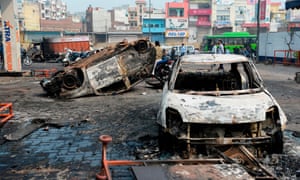The death toll from the worst religious violence in Delhi in decades has risen to 24, as Muslims fled from their homes and several mosques in the capital smouldered after being attacked by Hindu mobs.
The deathly clashes between Hindu and Muslim groups that began on Sunday continued into their forth consecutive day, with reports of early morning looting on some Muslim homes which had been abandoned out of fear.
More than 200 people were admitted to hospitals for injuries mainly from gunshot wounds as well as acid burns, stabbings and wounds from beatings and stone pelting. Several of those who died had jumped from high buildings to escape the attacking mobs.
On Wednesday, an intelligence bureau officer was declared among the dead in the clashes, after his body was found in a drain in the Chand Bagh area. It followed the death of a police officer on Monday after he was hit in the head with a stone.
Police said they had arrested 106 people in connection with the violence.
Delhi chief minister Arvind Kejriwal described the situation as “alarming” and said the army should be called to take control of the violence.
“Situation alarming,” he said in a tweet. “Police, despite all its efforts, unable to control situation and instil confidence. Army should be called in and curfew imposed in rest of affected areas immediately.”
On Tuesday afternoon, a violent Hindu mob of around 500 young men descended on to a mosque in Ashok Nagar, broke down the doors and climbed the minaret to fly a Hindu flag. They then set the mosque alight. Later in the evening, another smaller mosque and Muslim shops in the local market were burned.
A local Muslim, who asked not to be named out of fear for his safety, described how the mob had set about destroying the mosque for over three hours, shouting Hindu nationalist slogans as they went. “They came in the afternoon and burned everything inside and then they looted and burned the shop inside the mosque and then two Muslim houses next door,” he told the Guardian.
“I do not even know what to say. In 35 years I have never seen a situation like this, Hindus and Muslims always lived peacefully here. We all celebrated Eid and Diwali together. Hindu women often came into the mosque with their children, so this was not just a building for Muslims but for the whole community. But whatever peace we had is now gone.”

The attacks on Muslim properties continued on Wednesday morning. However, some local Hindus were patrolling the area to protect the mosque and offered to shelter Muslim families to keep them safe.
The riots have continued to spread across north-east Delhi, with Jafrabad, Babarpur, Brahmpuri, Gorakh Park, Maujpur, Bhajanpura, Kabir Nagar, Chand Bagh, Gokulpuri, Karawal Nagar, Khajuri Khas and Kardampuri all affected. Heavy deployment of Delhi police and paramilitary forces were visible in some of the worst hit areas on Wednesday morning.
Prime Minister Narendra Modi finally broke his silence on the violence, appealing for “peace and brotherhood”.
“Had an extensive review on the situation prevailing in various parts of Delhi,” tweeted Modi “Police and other agencies are working on the ground to ensure peace and normalcy.”
By Wednesday evening, an uneasy calm had descended on the city but there was a heavy police presence still on the streets. National security adviser Ajit Doval said the situation was “under control”.
It has been the bloodiest days of protest in India since Modi’s government passed a new citizenship amendment act, which grants citizenship for refugees of every major South Asian religion except Muslims, in December.
The law sparked a nationwide backlash over fears the law is discriminatory towards Muslims and will undermine the secular foundations of India by making religion the basis of citizenship, and demonstrations have continued across India for the past three months.
The violence in Delhi was sparked after Kapil Mishra, leader from the ruling Bharatiya Janata Party (BJP), incited a Hindu mob to violently remove a group of Muslims who were blocking a road in north-west Delhi in protest against the citizenship act. Groups on both sides began throwing stones and attacking each other, prompting an escalation of violence.
A legal order that prevents gatherings of more than four people, has been imposed across north-west Delhi. Police deployed tear gas but the measures failed to contain the mobs.
On Wednesday, the Delhi high court passed a series of orders relating to the religious violence in Delhi. The judges stated that “another 1984-like situation cannot be allowed to happen in this city under it’s watch”, referring to the anti-Sikh pogroms that broke out in India in 1984 following the assassination of prime minister Indira Gandhi, which saw over 3,000 Sikhs killed in Delhi.


Comments